Michigan Fireworks Law 2024 PDF: A Comprehensive Guide
The Michigan Fireworks Law 2024 PDF provides a detailed overview of state regulations, safety guidelines, and legal updates for fireworks use in Michigan. It includes key provisions, permitted types, and enforcement measures, ensuring compliance and public safety.
Download the guide to understand the latest rules and restrictions for consumer fireworks, novelties, and low-impact devices, along with penalties for violations and environmental considerations.
The Michigan Fireworks Law 2024 builds on the Fireworks Safety Act of 2012, legalizing consumer fireworks while enforcing strict regulations. It outlines permitted types, usage times, and safety measures to ensure public safety and environmental protection. The law balances recreational use with liability for violations, providing clarity for residents and sellers. Key updates in 2024 focus on enhancing enforcement and addressing community concerns.
Key Provisions of the Fireworks Safety Act of 2012
The Act legalized consumer fireworks in Michigan, set age restrictions, and required licensing for sellers. It regulates usage times and prohibits fireworks on public or school properties.
2.1. Legalization of Consumer Fireworks in Michigan
The Fireworks Safety Act of 2012 legalized the sale, use, and possession of consumer fireworks in Michigan. This law allowed residents to purchase and use fireworks like firecrackers, Roman candles, and bottle rockets. It established a framework for regulating their use, ensuring safety and compliance with state and local ordinances. The legalization took effect in 2012, marking a significant change in Michigan’s fireworks policies.
2.2. Definition of Consumer Fireworks
Consumer fireworks are devices designed to produce visible or audible effects through combustion, such as firecrackers, Roman candles, and bottle rockets. They are distinct from low-impact fireworks and novelties, which have smaller explosive effects. This category excludes high-powered display fireworks, which are typically reserved for professional use. The definition ensures clarity in regulation and safe usage under Michigan law.
Types of Fireworks Allowed Under Michigan Law
Michigan law permits consumer fireworks, low-impact fireworks, and novelties or trick fireworks, each defined by their combustion effects and usage regulations.
3.1. Consumer Fireworks
Consumer fireworks are pyrotechnic devices designed to produce visible and audible effects, such as firecrackers, Roman candles, and bottle rockets. Under Michigan law, these fireworks are legal for personal use on private property, with specific restrictions. They can be discharged during designated times, such as July 4th celebrations, but are prohibited on public, school, or church properties without explicit permission. Safety guidelines and manufacturer instructions must be followed to ensure responsible use.
3.2. Low-Impact Fireworks
Low-impact fireworks include items like sparklers, glowworms, and smoke bombs, producing minimal noise and effect. These devices are generally permitted year-round without special permits, making them accessible for casual use. Michigan law allows their use on private property, with no age restrictions for possession. They are a popular choice for small gatherings and family events, offering a safer alternative to louder, more explosive options.
3.3. Novelties and Trick Fireworks
Novelties and trick fireworks include items like sparklers, glowworms, and small trick devices. These are designed for minimal pyrotechnic effect and are often used for recreational purposes. Michigan law permits their use without special permits, making them accessible for private events and celebrations. They are generally considered safer and are suitable for all ages, though supervision is recommended to ensure safe handling and compliance with local regulations.
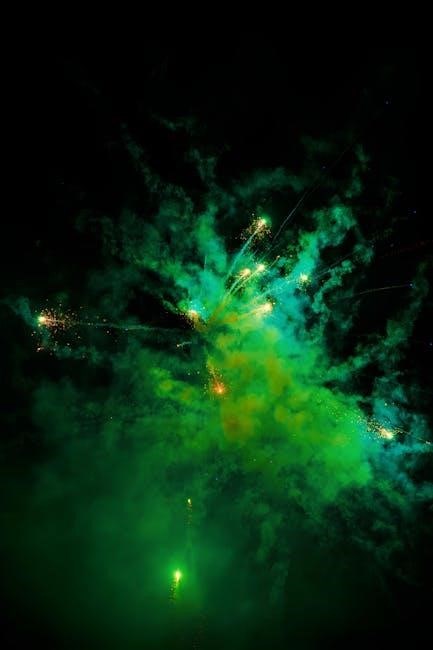
Purchase and Possession Laws
Michigan’s purchase and possession laws for fireworks require buyers to be at least 18 years old, with specific regulations on storage and use. Compliance is mandatory.
4.1. Age Restrictions for Purchasing Fireworks
Michigan law requires individuals purchasing fireworks to be at least 18 years old. This applies to all types of fireworks, including consumer fireworks, novelties, and low-impact devices. Sellers must verify the buyer’s age, and providing false information to purchase fireworks is a violation. This regulation aims to ensure responsible use and minimize risks associated with fireworks.
4.2. Permits and Licensing Requirements
Retail locations selling fireworks must meet specific conditions, including proper storage and display. Temporary structures require additional approvals. Local governments may issue permits for agricultural or wildlife fireworks use. Sellers must comply with state and local regulations to ensure legal operation. Licensing ensures public safety and adherence to Michigan’s fireworks laws.
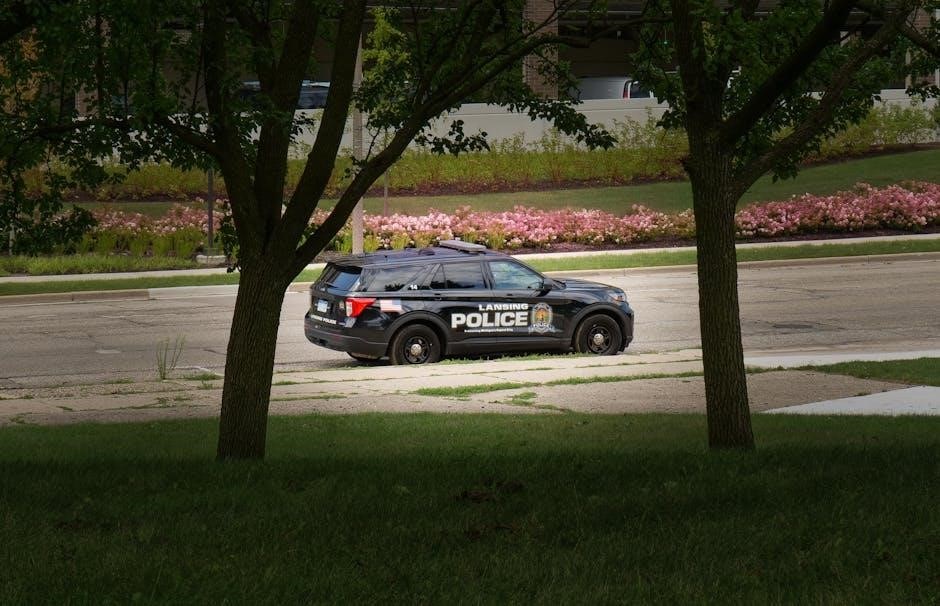
Use and Safety Regulations
Michigan fireworks laws require adherence to specific safety guidelines. Fireworks must not be used on public, school, church, or others’ property without permission. Always follow local ordinances to ensure safe and legal use, avoiding penalties for violations.
5.1. Allowed Times for Fireworks Use
Under Michigan law, fireworks use is permitted from 11 a.m. to 11:45 p.m. during specified periods, such as June 29 to July 5, 2024. Local ordinances may further restrict these hours or extend them for holidays like Independence Day. Always check local regulations to ensure compliance and avoid penalties for improper timing of fireworks use.
5.2; Prohibited Locations for Fireworks Use
Under Michigan law, fireworks cannot be used on public property, school grounds, church property, or another person’s property without explicit permission. Prohibited locations also include areas near hospitals, nursing homes, and places of assembly. Local ordinances may further restrict use in parks or densely populated areas to ensure safety and prevent disruptions. Violating these restrictions can result in fines or legal action.
5.3. Safety Tips and Precautions
Always use fireworks under adult supervision and follow manufacturer instructions. Keep a water source nearby and avoid loose clothing that may catch fire. Never relight malfunctioning fireworks or aim them at people or buildings. Ensure a safe distance from flammable materials like trees or buildings. Store fireworks in a cool, dry place and dispose of them properly after use to minimize risks and ensure compliance with Michigan’s safety guidelines.
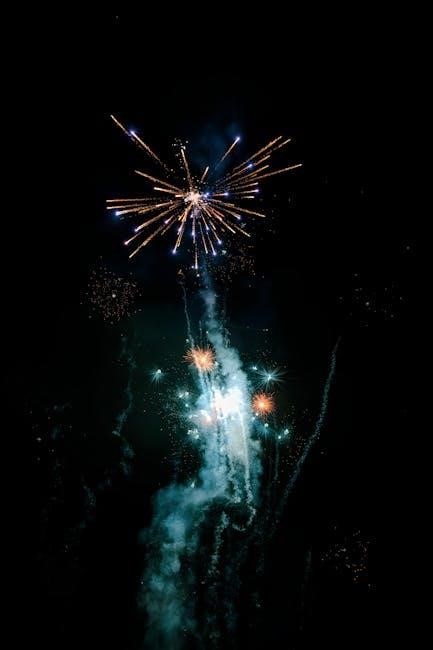
Local Ordinances and Municipal Regulations
Local governments in Michigan can establish specific rules for fireworks use, including time restrictions and permitted areas. These ordinances may be stricter than state laws.
Municipalities often regulate fireworks to address noise, safety, and property concerns, ensuring compliance with both state and local requirements for responsible fireworks use.
6.1. Examples of Local Fireworks Ordinances
Local ordinances in Michigan often restrict fireworks use to specific dates and times, such as June 29 to July 5, between 11 a.m. and 11:45 p.m. Some municipalities ban fireworks on public property, school grounds, or near sensitive areas like churches or hospitals.
Examples include noise restrictions, permits for large displays, and bans on certain types of fireworks. These rules aim to balance tradition with safety, often mirroring state laws but with stricter enforcement at the local level.
6.2. Interaction Between State and Local Laws
State fireworks laws in Michigan establish a framework, while local ordinances may impose stricter regulations. Municipalities can set specific dates, times, and prohibited areas for fireworks use, ensuring compliance with both levels of law. Local authorities enforce these rules, often mirroring state guidelines but tailoring them to community needs. This dual approach balances public safety with individual freedoms, ensuring legal and safe fireworks use across Michigan.
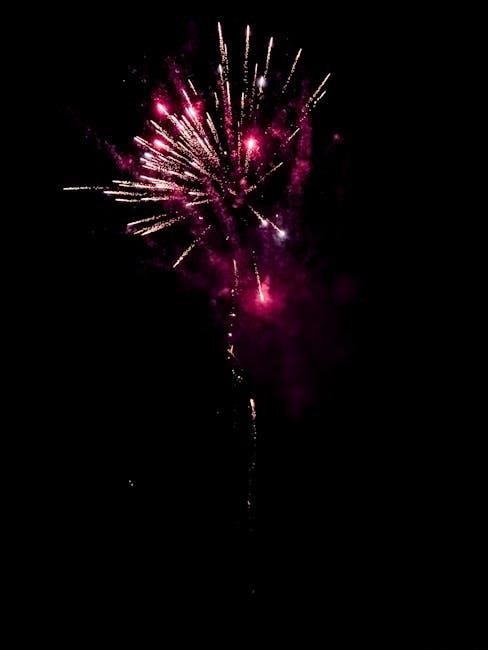
Licensing Requirements for Fireworks Sellers
Licensing Requirements for Fireworks Sellers ensure compliance with safety and legal standards. Retailers must obtain proper permits, meet location criteria, and adhere to storage and safety regulations. Temporary locations require additional approvals from local fire departments to operate legally in Michigan.
7.1. Retail Licensing for Fireworks Sales
To sell fireworks in Michigan, retailers must obtain a retail fireworks license. Applicants must meet strict criteria, including operating from a permanent structure, complying with fire safety standards, and maintaining adequate insurance. Temporary stands or seasonal locations require additional approvals and inspections. The licensing process involves submitting detailed applications, paying fees, and ensuring compliance with local and state regulations. Proper signage and storage are also mandated to ensure public safety.
7.2. Wholesale and Distributor Licensing
Wholesale and distributor licensing in Michigan requires special permits for selling fireworks to retailers. Applicants must pass rigorous inspections, ensure secure storage facilities, and maintain proper records. Distributors must also comply with state and federal regulations, including fire safety standards. Licenses are typically issued annually, with renewal contingent on continued compliance. Violations can result in penalties, fines, or license revocation, emphasizing the need for strict adherence to legal requirements.
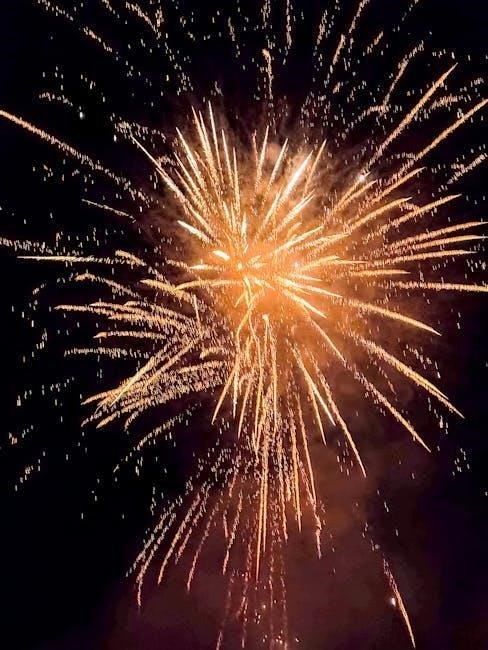
Penalties for Violating Fireworks Laws
Violations of Michigan fireworks laws result in penalties, including fines and criminal charges. Non-compliance can lead to legal consequences, emphasizing the importance of adhering to regulations and ensuring public safety.
8.1. Fines and Criminal Charges
Violating Michigan’s fireworks laws can result in significant fines and criminal charges. First-time offenders may face fines up to $500, while repeat violations can lead to fines of $1,000 or more. In severe cases, criminal charges may apply, potentially leading to misdemeanor convictions and even jail time. These penalties emphasize the importance of complying with state and local fireworks regulations to avoid legal consequences.
8.2. Liability for Property Damage or Injuries
Under Michigan’s fireworks law, individuals may face liability for property damage or injuries caused by fireworks. Legal action can be taken against those responsible, requiring compensation for damages or medical expenses. This emphasizes the importance of responsible fireworks use to avoid financial and legal repercussions, even when used legally.

Michigan Fireworks Law 2024 PDF Guide
The Michigan Fireworks Law 2024 PDF Guide offers a detailed breakdown of state fireworks regulations, safety protocols, and legal updates. It serves as a resource for understanding compliance and safe practices, ensuring users are informed about the latest rules governing fireworks in Michigan.
9.1. What the 2024 Guide Includes
The 2024 Michigan Fireworks Law Guide provides a comprehensive overview of state fireworks regulations, including legal definitions, safety guidelines, and environmental considerations. It details permitted fireworks types, usage restrictions, and updated penalties for violations. The guide also offers practical advice for safe handling and compliance with local ordinances, ensuring users understand their responsibilities; It is a valuable resource for both consumers and sellers to navigate Michigan’s fireworks laws effectively.
9.2. How to Access the PDF Document
To access the Michigan Fireworks Law 2024 PDF, visit the official Michigan government website or the Michigan Municipal League portal. The document is available for free download and contains detailed information on regulations, safety tips, and legal updates. Simply search for “Michigan Fireworks Law 2024 PDF” and follow the download instructions. Ensure you access it from verified sources for accuracy and reliability.
Recent Updates to Michigan Fireworks Law
The 2024 Michigan Fireworks Law updates include stricter safety regulations, enhanced environmental protections, and clarified restrictions on usage times. The PDF guide outlines these changes for public reference.
10.1. Changes in Regulations for 2024
The 2024 Michigan Fireworks Law introduces stricter safety regulations, including enhanced restrictions on discharge times and locations. Environmental protections are emphasized, with limits on high-impact fireworks. The PDF guide details new permit requirements for public displays and increased penalties for violations. These updates aim to balance public safety, environmental concerns, and the enjoyment of fireworks during celebrations.
10.2. Public Response to the Updates
The public response to Michigan’s 2024 fireworks law updates has been mixed. Many appreciate the enhanced safety and environmental protections, while others express concerns about stricter regulations. Some residents feel the new discharge time restrictions infringe on traditional celebrations, particularly around July 4th. Local communities are adapting, with some seeking permits for public displays, ensuring compliance while maintaining festive traditions.
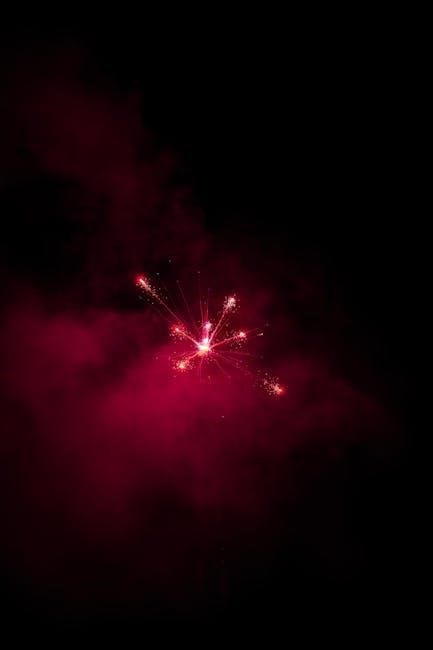
Enforcement of Fireworks Laws in Michigan
Enforcement of Michigan’s fireworks laws primarily falls on local authorities, including police and fire departments, who ensure compliance with state regulations and issue necessary permits.
11.1. Role of Local Authorities
Local authorities in Michigan play a crucial role in enforcing fireworks laws, monitoring permits, and ensuring compliance with safety regulations. They conduct inspections, respond to complaints, and impose penalties for violations. Local governments also work closely with residents to educate them on legal fireworks use and promote community safety during celebrations.
11.2. Reporting Violations
Residents can report fireworks law violations to local authorities, such as police or fire departments. Reports can be made via phone, online forms, or in-person. When reporting, provide details like location, time, and nature of the violation. Authorities investigate complaints to ensure compliance with state and local regulations, addressing safety concerns and enforcing legal standards effectively.
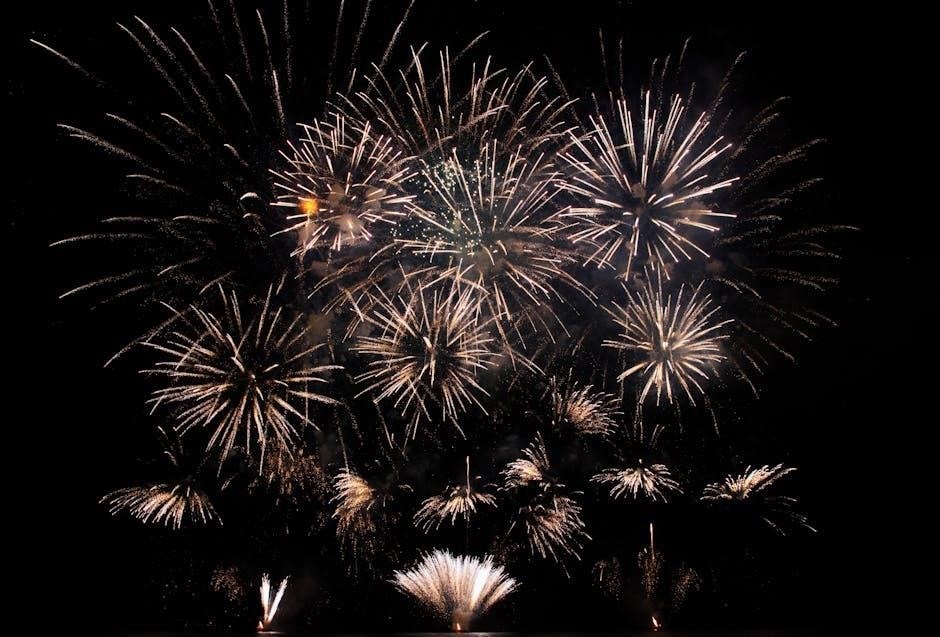
Environmental and Safety Concerns
The 2024 guide highlights environmental impacts, such as air quality issues from fireworks, and safety risks, including injuries and wildfires, urging responsible usage to mitigate these concerns.
12.1. Fireworks and Air Quality
Fireworks emit pollutants like particulate matter, carbon monoxide, and volatile organic compounds, degrading air quality. Michigan’s 2024 guide emphasizes monitoring firework-related emissions and issuing public advisories during poor air quality events to protect sensitive populations, aligning with environmental protection goals while balancing legal usage regulations.
12.2. Fireworks and Wildlife Impact
Fireworks can disrupt wildlife habitats, causing stress and displacement of animals. The 2024 Michigan Fireworks Law guide highlights the need to minimize disturbances, especially in sensitive ecosystems. It recommends avoiding fireworks in wildlife-prone areas and suggests quieter alternatives to reduce stress on animals. Environmental agencies collaborate to monitor and mitigate these impacts, ensuring a balance between celebration and wildlife conservation.
The Michigan Fireworks Law 2024 PDF serves as an essential resource for understanding state regulations, safety measures, and environmental considerations. By adhering to these guidelines, residents can enjoy fireworks responsibly while minimizing risks to public safety and wildlife; Stay informed and ensure compliance to make celebrations safe and enjoyable for everyone.